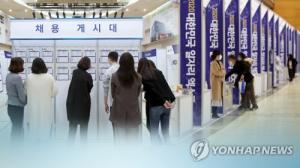Eight out of 10 citizens believe that this year’s employment situation will be worse than before the novel coronavirus infection (Corona 19). In addition, 7 out of 10 expected their salary to move in place.

The Korea Economic Research Institute (Kyung-Yeon Han), affiliated with the National Federation of Entrepreneurs, commissioned Mono Research, a public opinion polling agency, to survey 1,000 men and women aged 18 years and over nationwide.
As a result of the survey, when asked about the employment situation this year compared to before Corona 19 (2019), 44.6% of all respondents answered that it was’very worse’ and 32.7% said that it was’a little worse’. Only 8.3% of the total (a little improvement of 5.3%, an improvement of 3.0%) was only 8.3% of the total.
In particular, in the case of respondents in their twenties who are on the job front, the majority (53.2%) said that it would be very deteriorating, and 30.0% said that it was a little worse. 0% of respondents said that it was very improved, representing the gloomy outlook of the youth.
The main cause of the worsening of the employment situation was the continued Corona 19 (45.3%), strengthening corporate regulations by the National Assembly and the government (26.3%), the government’s pro-union policy (10.7%), and poor business performance (10.5%). And the absence of a new growth engine industry (7.2%).
As tasks to improve this, deregulation of companies (24.9%), flexibility in the employment market (21.9%), expansion of public jobs (15.5%), and incentives for companies to increase employment (15.3%) were cited.
By age, a high percentage of those in their 20s supported corporate revitalization policies such as deregulation (25.0%) and increased incentives for employment growth (21.2%). %) was higher than other age groups.
Semiconductor (21.4%) is the industry that is expected to increase jobs most in the future, followed by new businesses such as bio (20.6%).
On the other hand, lodging and restaurants (22.5%) were expected to see fewer jobs, followed by machinery, ships, steel (17.4%), and construction (14.5%).
The prospects for salary were also bleak. Seven out of 10 respondents (68.9%) said that their salary will not rise against inflation.
When asked what is most important for future income growth, they answered in the order of financial technology (32.9%) such as stocks and real estate, strengthening and promoting work capabilities (14.9%), start-up (9.1%), and turnover (7.8%).
As the most promising financial means, real estate (30.1%) was selected even in the recent tightening of regulations, followed by stocks (28.4%). In addition, there were answers such as real assets such as gold and copper (8.3%), deposits and savings (6.8%), cryptocurrency (6.1%), and foreign currency (3.7%).
By gender, men preferred real estate (30.9%) and women preferred stocks (32.3%). By age, those in their 30s (33.4%), 50s (30.4%), and 60s (31.1%) ranked real estate, and those in their 20s (40.0%) and 40s (28.9%) ranked stocks as the best financial means.
“The fact that the people are still forecasting the employment situation negatively despite the atmosphere of COVID-19 mitigation can be seen as a weakening of the growth vitality of the Korean economy.” The creation of a job market that has eased the blocking regulations and lowered the entry barrier for vested interests should be given priority,” he argued.
Copyright © Finance Today Unauthorized reproduction and redistribution are prohibited.
Finance Today is now a global mediaI will grow up with it.
Your Precious Sponsorship from CNN, The New York Times, and Reuters Influence To create media Preciously I will write it.

Sponsoring Finance Today
